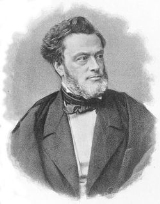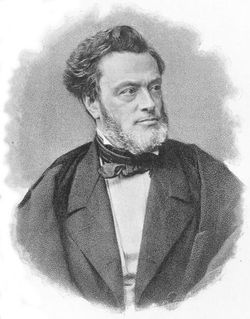
Jules Favre
Encyclopedia

Opportunist Republicans
The Opportunist Republicans , also known as the Moderates , were a faction of French Republicans who believed, after the proclamation of the Third Republic in 1870, that the regime could only be consolidated by successive phases...
faction.
Early life
He was born in LyonLyon
Lyon , is a city in east-central France in the Rhône-Alpes region, situated between Paris and Marseille. Lyon is located at from Paris, from Marseille, from Geneva, from Turin, and from Barcelona. The residents of the city are called Lyonnais....
, and began his career as a lawyer. From the time of the Revolution of 1830
Revolution of 1830
The Revolution of 1830 can be:* The July Revolution in France leading to a constitutional monarchy lasting until the revolutions of 1848* The Belgian Revolution in the United Kingdom of the Netherlands leading to the creation of Belgium...
, he openly declared himself a republican
Republicanism
Republicanism is the ideology of governing a nation as a republic, where the head of state is appointed by means other than heredity, often elections. The exact meaning of republicanism varies depending on the cultural and historical context...
, and in political trials he took the opportunity to express this opinion. After the Revolution of 1848 he was elected deputy for Lyon to the Constituent Assembly, where he sat among the moderate republicans, voting against the socialists. When Louis Napoleon was elected President of France, Favre openly opposed him, and on 2 December 1851 he tried with Victor Hugo
Victor Hugo
Victor-Marie Hugo was a Frenchpoet, playwright, novelist, essayist, visual artist, statesman, human rights activist and exponent of the Romantic movement in France....
and others to organize armed resistance in the streets of Paris. After the coup d'état
Coup d'état
A coup d'état state, literally: strike/blow of state)—also known as a coup, putsch, and overthrow—is the sudden, extrajudicial deposition of a government, usually by a small group of the existing state establishment—typically the military—to replace the deposed government with another body; either...
, he withdrew from politics, returned to the legal profession, and distinguished himself by his defence of Felice Orsini
Felice Orsini
Felice Orsini was an Italian revolutionary and leader of the Carbonari who tried to assassinate Napoleon III, Emperor of the French.-Early:Felice Orsini was born at Meldola in Romagna, then part of the Papal States....
, the perpetrator of the attack against the life of Napoleon III.
In 1858 he was elected deputy for Paris, and was one of the "Five" who gave the signal for the republican opposition to the Empire. In 1863 he became the head of his party, and delivered a number of addresses denouncing the Mexican expedition and the occupation of Rome. These addresses, eloquent, clear and incisive, won him a seat in the Académie française
Académie française
L'Académie française , also called the French Academy, is the pre-eminent French learned body on matters pertaining to the French language. The Académie was officially established in 1635 by Cardinal Richelieu, the chief minister to King Louis XIII. Suppressed in 1793 during the French Revolution,...
in 1867.
Franco-Prussian War and Third Republic

Adolphe Thiers
Marie Joseph Louis Adolphe Thiers was a French politician and historian. was a prime minister under King Louis-Philippe of France. Following the overthrow of the Second Empire he again came to prominence as the French leader who suppressed the revolutionary Paris Commune of 1871...
he opposed the war against Prussia
Franco-Prussian War
The Franco-Prussian War or Franco-German War, often referred to in France as the 1870 War was a conflict between the Second French Empire and the Kingdom of Prussia. Prussia was aided by the North German Confederation, of which it was a member, and the South German states of Baden, Württemberg and...
in 1870, and at the news of the defeat of Napoleon III at Sedan
Battle of Sedan
The Battle of Sedan was fought during the Franco-Prussian War on 1 September 1870. It resulted in the capture of Emperor Napoleon III and large numbers of his troops and for all intents and purposes decided the war in favour of Prussia and its allies, though fighting continued under a new French...
he demanded the deposition of the emperor. Favre opposed the removal of the government from Paris during the siege.
In the government of National Defence he became vice-president under General Trochu
Louis Jules Trochu
Louis Jules Trochu was a French military leader and politician. He served as President of the Government of National Defense—France's de facto head of state—from 4 September 1870 until his resignation on 22 January 1871 .- Military career :He was born at Palais...
, and minister of foreign affairs, with the onerous task of negotiating peace with victorious Germany. He proved to be less adroit as a diplomat than he had been as an orator, and committed several irreparable blunders. His famous statement on 6 September 1870, that he "would not yield to Germany an inch of territory nor a single stone of the fortresses" was a piece of oratory which Bismarck
Otto von Bismarck
Otto Eduard Leopold, Prince of Bismarck, Duke of Lauenburg , simply known as Otto von Bismarck, was a Prussian-German statesman whose actions unified Germany, made it a major player in world affairs, and created a balance of power that kept Europe at peace after 1871.As Minister President of...
met on the 19th by his declaration to Favre that Alsace
Alsace
Alsace is the fifth-smallest of the 27 regions of France in land area , and the smallest in metropolitan France. It is also the seventh-most densely populated region in France and third most densely populated region in metropolitan France, with ca. 220 inhabitants per km²...
and Lorraine
Lorraine (province)
The Duchy of Upper Lorraine was an historical duchy roughly corresponding with the present-day northeastern Lorraine region of France, including parts of modern Luxembourg and Germany. The main cities were Metz, Verdun, and the historic capital Nancy....
had to be ceded as a condition of peace.
He arranged for the armistice
Armistice
An armistice is a situation in a war where the warring parties agree to stop fighting. It is not necessarily the end of a war, but may be just a cessation of hostilities while an attempt is made to negotiate a lasting peace...
of 28 January 1871 without knowing the situation of the armies, and without consulting the government at Bordeaux
Bordeaux
Bordeaux is a port city on the Garonne River in the Gironde department in southwestern France.The Bordeaux-Arcachon-Libourne metropolitan area, has a population of 1,010,000 and constitutes the sixth-largest urban area in France. It is the capital of the Aquitaine region, as well as the prefecture...
. By a grave oversight, he neglected to inform Léon Gambetta
Léon Gambetta
Léon Gambetta was a French statesman prominent after the Franco-Prussian War.-Youth and education:He is said to have inherited his vigour and eloquence from his father, a Genovese grocer who had married a Frenchwoman named Massabie. At the age of fifteen, Gambetta lost the sight of his right eye...
that the Army of the East
Armée de l'Est
The Armée de l'Est was a French army which took part in the Franco-Prussian War of 1870–71...
(80,000 men) was not included in the armistice, and it was thus obliged to retreat to neutral territory. He showed no diplomatic skill in the negotiations for the Treaty of Frankfurt
Treaty of Frankfurt (1871)
The Treaty of Frankfurt was a peace treaty signed in Frankfurt on 10 May 1871, at the end of the Franco-Prussian War.- Summary :The treaty did the following:...
, and it was Bismarck who imposed all the conditions. He withdrew from the ministry, discredited, on 2 August 1871, but remained in the Chamber of Deputies. Elected Senator on 30 January 1876, he continued to support the government of the republic against the reactionary opposition until his death on 20 January 1880.
Scandal in the Post-War Years
Favre turned out to have a skeleton in his closet, although he probably never saw it as such. He had a series of children with a married woman who never got a divorce. Although Favre recognized these children as his own legally, the story did not become known generally until after 1871, when his bungling of the diplomacy with Bismarck left him a good target for political enemies. The story was released, and Favre did win damages against one of the men who released it, but whatever influence he might still have had was smashed. Ironically, it is apparent that his old opponent, Napoleon III knew of the situation, but as Favre never attacked the Emperor about his sexual affairs, the Emperor respected Favre on the same issue.Works
His works include many speeches and addresses, notably La Liberté de la Presse (1849), Défense de F. Orsini (1866), Discours de réception a l'Académie françaiseAcadémie française
L'Académie française , also called the French Academy, is the pre-eminent French learned body on matters pertaining to the French language. The Académie was officially established in 1635 by Cardinal Richelieu, the chief minister to King Louis XIII. Suppressed in 1793 during the French Revolution,...
(1868), Discours sur la liberté intérieure (1869). In Le Gouvernement de la Défense Nationale, 3 vols., 1871–1875, he explained his role in 1870–1871.
After his death his family published his speeches in 8 volumes.
Further reading
- G Hanotaux, Histoire de la France contemporaine (1903, etc.)
- E Benoît-Lévy, Jules Favre (1884).
- Roger L. Williams, Manners and Murders in the world of Louis-Napoleon (Seattle, London: University of Washington, c1975), p. 93-101 (regarding Favre's family life, the scandal, and the legal repercussions). ISBN 0-295-95431-0

